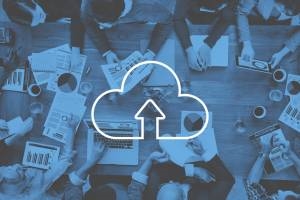What CPAs Need to Know About Cloud Technology in 2021?
What CPAs Need to Know About Cloud Technology in 2021?

We can’t argue with the fact that cloud computing received a lot of momentum in the year 2020 and is the reason why cloud computing is forecasted to increase to the revenue of USD 163 billion in the year 2021.
What does cloud computing mean for CPAs?
How can accounting firms and CPAs incorporate cloud technology in their business? Is their data at risk? Would they gain the power to serve customers better?
Start thinking of cloud technology as your business on the internet.
Everything from your applications to desktop infrastructure can be stored on the cloud in a remote server, and you can easily access it anywhere from any possible smart device with an internet connection.
You don’t have to go through the hassle of setting up on-premise technology architecture to achieve more processing power, better storage, and improved management. All you need is the cloud!

Of course, you can conduct your business on the cloud easily. With the advancements that we have observed in 2020, the next year is made for the cloud. There’s no doubt about that!
Here are some trends and facts that CPAs should know about the cloud in 2021.
1. The Rise of DaaS
Desktop as a Service is where you get the workplace environment as an online instance. You don’t need an actual computer to access your desktop. You just need an internet connection and password to your cloud instance.
This means that CPA firms can use Desktop as a Service to purchase only as many desktop instances as they need at the time. They don’t have to go through hardware and software updates, which can put a dent in their pocket from time to time.
The simple idea behind Desktop as a Service in a CPA firm is that everyone gets to use the latest technology and new software. The security is centralized for every desktop, and communication is improved. It is a win-win situation.
You can reduce costs and increase efficiency. That’s the perfect combination that every CPA needs from their technology implementations.
2. Hybrid Cloud Adoption
Since the cloud’s emergence, it has been a challenging task to select the right type of cloud: private, public, or hybrid. Every cloud hosting type has various benefits and a few drawbacks. As per the organization, some decide to go with public clouds, and others choose a private cloud for more controlled and streamlined working.
There’s truly no one-size-fits-all here.
However, what we can say about the hybrid cloud is that it improves performance, flexibility, compliance, and security. Everything falls in the right blend for a large number of organizations. Hence, service providers have also started reassessing their users’ needs, and CPA firms have begun migrating to the hybrid cloud.
What does that mean for CPA firms?
This means that you would be storing your data on a private or on-premise network for better control, but the public cloud would be utilized for content delivery. This blend helps you mitigate the security concerns and lower the costs of management.
In fact, there’s a growing demand for bare metal space, where CPAs would be allowed to put their existing systems on the cloud simply without going through pre-installation and implementation. This is still relatively new.
But, the overall idea of the hybrid cloud is gaining popularity in CPA firms and other industries.
3. Enhanced Storage Power
Data is the oil that fuels our businesses, every business in literal terms. If you don’t have valuable data, your business activities would be vague. For example, without data, how would you know if you are generating revenue or improving productivity?
So, here, we can safely infer that CPA firms need to store huge amounts of data. When they use the cloud to process and capture this data, their hassle reduces. Storing this much data in-house or on-premise would only increase the chances of theft. On the cloud, such risks are reduced, and storage scalability is enhanced.
4. Remote Working
As a CPA, you need to always stay available for customers as well as employees. You can’t miss calls or avoid sending details that your clients need. Even when you are physically not in the office, you have to cater to customers’ needs. But that is difficult! You can’t really cater to your customers when you are miles away from your accounting tools and data.
Or is that really the case?
With the pandemic teaching us a lesson the hard way, CPA firms are moving towards cloud hosting and hosting their accounting solutions on the cloud to improve their remote abilities. This implementation would only allow you to utilize your applications and data on any desktop and tablet.
For example, if you host QuickBooks on the cloud, you would be able to access it securely from anywhere, anytime.
5. Disaster Recovery
When we entered 2020 over a year back, we never thought disaster recovery would become so important. The coronavirus pandemic shut us in our homes, and multiple other natural disasters disrupted our businesses. In this time, companies that had cloud implementations were able to improve:
-
Infrastructure
-
Security
-
Application portability
-
Networking
They could access their data remotely and still work for their clients. Even when the workplace’s data was lost due to a natural disaster, these leaders could recover it sooner than anyone.
In 2021, disaster recovery will become extremely necessary for organizations and CPA firms. They would put more effort into improving their disaster recovery and preparedness, and the cloud is the best way to do that.
Conclusion
In reality, every organization uses the cloud in some way or the other. But, complete adoption of this technology or moving your data to the cloud, or hosting an application like QuickBooks to the cloud is a big step for every CPA. We have discussed how the cloud will change in 2021 in this article to resolve all your doubts.
Image Credit: shutterstock
The post What CPAs Need to Know About Cloud Technology in 2021? appeared first on ReadWrite.
(24)

